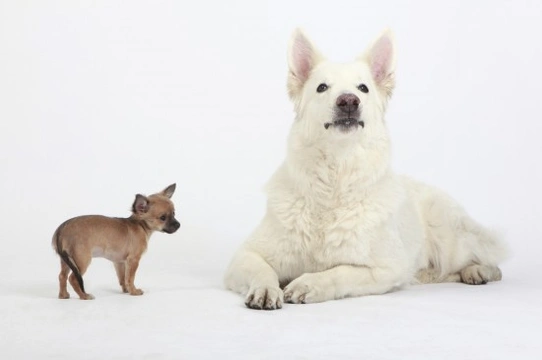
Small dog aggression towards larger dogs
If you frequent dog parks or other areas where a lot of dogs congregate on a regular basis, you have almost certainly witnessed a little pint-sized terror standing up to, or even trying to take on, a much larger dog that did not initiate aggression. While this can in the first instance be rather funny to see as it seems to ill-informed and out of place, small dog aggression towards larger dogs is no joke, and can potentially have major consequences.
If a small dog behaves aggressively towards a larger dog that does not appear phased by them, the ultimate result may be that the smaller dog attacks the larger one, and those sharp little teeth can of course cause damage! Even worse, is if a smaller dog fronts up to a larger dog unprovoked, and the otherwise innocent larger dog responds defensively in kind, they have the potential to badly injure or even kill the smaller dog.
If you own a small dog that seems to always be looking for a scrap with the big dogs and isn’t afraid of biting off more than they can chew, this is a problem that you should take seriously, and take steps to address. In this article, we will look in more detail at small dog aggression towards larger dogs, and what to do about it. Read on to learn more!
What causes some small dogs to challenge larger dogs?
There are multiple potential reasons behind why a small dog might go out of their way to face up to a larger dog, and identifying the causes for it can give you a head start in resolving the problem.
The lapdog perspective
When at floor level, small dogs and toy dogs are of course much shorter than large dogs, and will be very aware of this when looking up at their bigger cousins! However, many small dogs are carried around for a large part of the time in their owner’s arms, physically raising the smaller dog up to a height above the bigger dog, and potentially, instilling a greater sense of security and confidence in the smaller dog.
Added to this, a small dog that is being held by their owner will feel more confident about their behaviour, as they know that their owner will intervene or retreat to keep them safe if the larger dog barks back or engages with the smaller dog’s aggression.
Learned behaviours
The larger the dog, the more likely they will be to have been well trained by their responsible owners to be aware of their size and potential to inadvertently cause harm to smaller animals, and they will tend to moderate their play and responses to curb their strength and inhibit themselves in how they deal with smaller dogs.
This is a skill that smaller dogs rarely have to learn, and so small dogs may well bound up to a larger dog and attempt to engage with them, which may have resulted in the larger dog retreating or permitting pushy behaviours, due to their training to moderate their responses. This means that small dogs may have learned through experience that they can cause a much larger dog to yield to them, thinking that they are then top dog the next time they face another, different big dog!
Larger dog’s awareness
Some larger dogs do not really seem to register the presence of small dogs, and particularly, do not register them as a genuine threat. If a small dog barks and snarls at a larger dog and the larger dog simply ignores them and wanders off because they were going away anyway, this may lead the small dog to believe that they have “won” the stand-off, and potentially purse the other dog, attacking or baiting them when they are in retreat.
Inherent breed traits
While many small and lapdog breeds were bred to be pets, companions and lapdogs and not working dogs, many smaller dogs have a strong working history and were prized historically for their bravery and tenacity. This is particularly true of most small dogs from the terrier breed grouping, and also the Chihuahua, who shares many traits with terriers.
Dogs that have a working history of taking on larger prey and threats, such as foxes and badgers, are likely to be generally bold and confident, and more likely to fancy their chances against larger dogs.
Dealing with small dog aggression towards larger dogs
It would be a big mistake to simply ignore or disregard small dog aggression towards larger dogs, as this can pose both a problem and a danger for the smaller dog and any other dogs that they come into contact with.
Regardless of the size of your dog, ensure that they are well trained in the basic commands such as recall and good behaviour, and also that they are well socialised and used to mixing with dogs of all shapes and sizes. Don’t carry your small dog everywhere, allow them to walk on their own and see the world from their own natural perspective, and do not intervene immediately every time another dog approaches or tries to engage with your dog.
If your small dog regularly displays aggression towards larger dogs, enlist the help of a dog trainer of behaviourist who can help you to control your dog’s reactions, and work with you and another dog over time to teach your small dog about appropriate behaviour.



